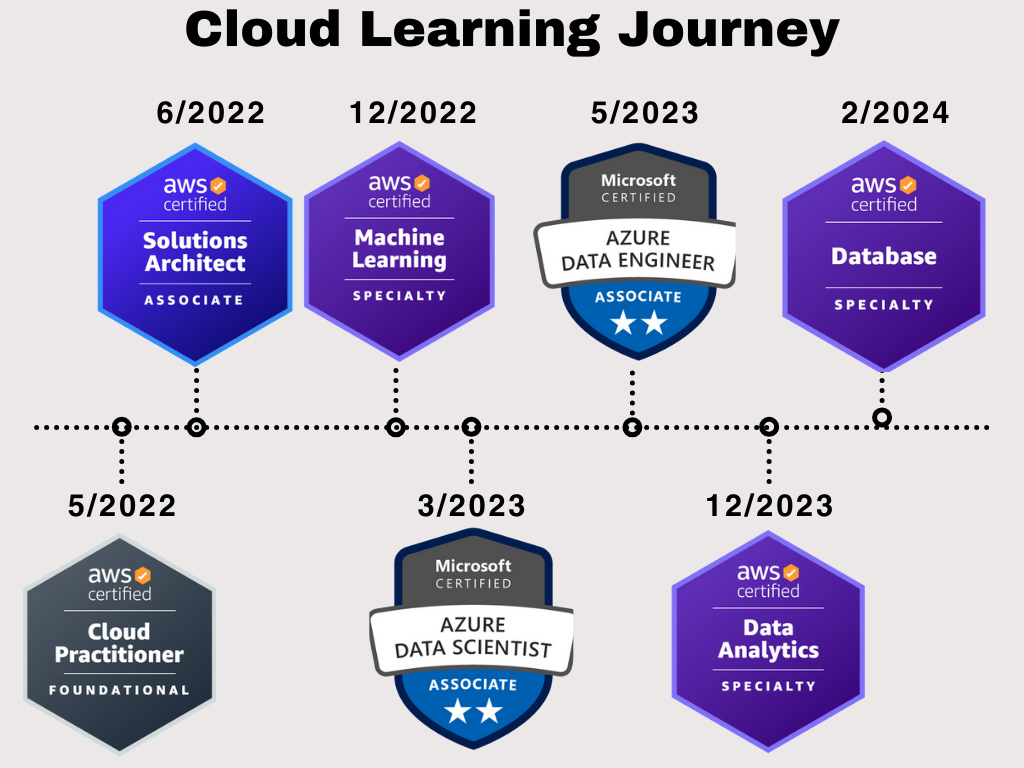Head in the Cloud (Technology)
My Journey in Learning the Cloud - AWS and Azure
My Journey in Learning the Cloud: AWS and Azure
I began my career in IT, at a time when the State of Texas had already achieved 90% IT consolidation. This was a major milestone for Texas, considering its size and the historical preference for decentralized control over IT resources. While it’s true that some organizations value maintaining full control, outsourcing IT services brings significant advantages such as modernization and ongoing support.
As technology evolves, the next frontier for data services is the cloud, and it’s no surprise that much of the internet is powered by cloud computing today.
The Benefits of the Cloud:
- Scalability: The cloud offers the flexibility to scale resources up or down based on demand.
- Cost Efficiency: With a pay-as-you-go model, cloud services reduce the need for substantial upfront capital investment in hardware.
- Innovation: The cloud accelerates the pace of innovation, providing access to cutting-edge technologies and services.
- Accessibility: Cloud solutions enable global access and collaboration from anywhere with an internet connection.
As I pursue my studies in machine learning and data science, it has become increasingly clear that running complex workloads without relying on cloud infrastructure is nearly impossible. Acquiring powerful hardware, such as GPUs, is becoming prohibitively expensive due to rising costs in the tech industry. Cloud services like Amazon SageMaker Studio Lab, Kaggle, and Google Colab have already simplified the process of running machine learning models in the cloud.
My Goal:
My ambition is to support and run machine learning workloads in the cloud, leveraging its power, flexibility, and cost-efficiency.
My Cloud Learning Journey

To stay ahead in the ever-evolving landscape of cloud computing, I’ve specialized in two of the largest cloud providers—AWS and Azure. Here’s a breakdown of my cloud certifications and key learnings:
1. AWS Cloud Practitioner (5/2022)
- This certification provided an excellent foundation for understanding cloud technologies and services.
- It helped me become familiar with the basics of cloud computing and how to navigate AWS resources.
2. AWS Certified Solutions Architect - Associate (6/2022)
- This certification built on my AWS Cloud Practitioner knowledge and introduced me to crucial concepts like:
- Disaster recovery strategies (e.g., Backup and Restore vs. Multi-site Active/Active)
- Networking basics, including IP ranges and VPCs
- Security best practices, including configuring Security Groups and NACLs
- Architecture design, such as hosting a website in a public VPC while placing the database in a private VPC
- Niche services like AWS Kinesis for streaming data
3. AWS Certified Machine Learning - Specialty (12/2022)
- I delved deeper into machine learning frameworks such as Scikit-learn, PyTorch, and MXNet.
- I learned how to access pre-trained models from AWS and third-party sources like Hugging Face.
- This certification also enhanced my ability to configure training and inference pipelines via APIs and SDKs and host endpoints for real-time inference.
4. Microsoft Certified: Azure Data Scientist Associate (3/2023)
- I explored the Azure Machine Learning suite, focusing on the drag-and-drop interface for building machine learning pipelines and workflows.
- I also learned how to provision compute resources and manage clusters that handle data import, transformation, training, and inference.
5. Microsoft Certified: Azure Data Engineer Associate (5/2023)
- This certification exposed me to powerful Azure offerings, such as Azure Synapse, ETL tools, and data warehousing.
- A standout feature was learning about time deltas, a useful concept for version control of data.
6. AWS Certified Data Analytics - Specialty (12/2023)
- I studied AWS tools like Athena for querying data and AWS Glue for data cataloging and ETL processes.
- I also explored how to build data lakes and integrate them with other services for advanced analytics.
7. AWS Certified Database - Specialty (2/2024)
- I gained deeper insights into database management, including the various types of databases (relational, NoSQL, etc.) and object storage solutions.
The Path Forward
My next step is to apply the knowledge I’ve gained from these certifications to real-world machine learning projects. I’m eager to continue learning and to gain hands-on experience in deploying cloud-based ML solutions.
A special thanks to my organization’s Learning and Development Team at Capgemini for sponsoring my cloud training. I also want to express my gratitude to Whizlabs for providing exceptional practice exams and labs, which played a crucial role in my preparation.
Stay tuned for more updates as I continue my journey in the cloud!